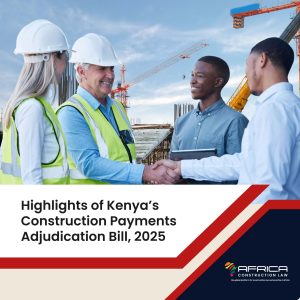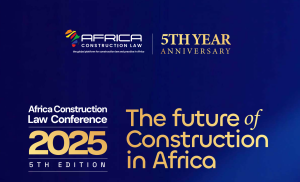TREATMENT BY COURTS, OF ADJUDICATION, AS AN ALTERNATIVE FORM OF DISPUTE RESOLUTION IN CONSTRUCTION DISPUTES – SOUTH AFRICA, TANZANIA AND NAMIBIA
by Thethe Mokele, Senior Associate, Pinsent Masons and Kirsten Gilbert-Dempsey, Lawyer Designate, Pinsent Masons
Adjudication, as an alternative form of dispute resolution, aims to provide confidential and prompt decisions which are binding unless revised or set aside. A key advantage of adjudication within the scope of the construction industry is that it is a means to resolve disputes on an interim basis whilst protecting and facilitating cash-flow during the project. Parties to a construction contract are consequently able to avoid a drawn-out and costly dispute resolution process – such as arbitration or litigation – while simultaneously ensuring that the works of the project continue.
Countries around the world have been introducing adjudication as part of their legislative framework around ADR mechanisms in the construction industry., These include the likes of the United Kingdom, Australia, Singapore and Ireland. Conversely, other jurisdictions have experienced an increase in the use of adjudication proceedings in the construction industry as a dispute resolution mechanism without any statute regulating the process. Adjudication as an ADR mechanism in Africa has already been discussed in relation to Nigeria and Kenya in previous African Construction Law articles. This article unpacks construction adjudication in three further African countries, namely, South Africa, Tanzania and Namibia, and considers how far it has developed in these jurisdictions as well as the enforcement landscape drawing from case law, where applicable.
ADJUDICATION IN SOUTH AFRICA
There is currently no statutory framework in South Africa regulating adjudication as a dispute resolution mechanism. The construction industry in South Africa has, however, widely adopted adjudication as a dispute resolution mechanism on major infrastructure and energy projects, through the dispute resolution clauses contained in most standard form construction contracts i.e. FIDIC, NEC and JBCC. There is no limit as to the nature of disputes which can be referred to adjudication, with most contracts requiring all disputes that arise under the contract to be referred to adjudication, as the first step in a multi-tiered dispute resolution process.
In South Africa, parties to construction contracts can either agree to resolve their disputes as provided in the contract or they may wish to make use of another organisations’ rules and procedures. There are a few organisations in South Africa which prescribe adjudication rules for use in the adjudication process such as the Construction Adjudication Association of South Africa and Association of Arbitrators (Southern Africa).
The South African courts have, in a 2013 judgment, described adjudication as “a measure for the summary and interim resolution of disputes, subject to their final resolution by arbitration where appropriate”.[1] There is consistent judicial precedent confirming the binding and enforceable nature of an adjudicator’s decision until such time as it is replaced by an arbitral award. Accordingly, the South African courts will only interfere with an adjudicator’s award in limited circumstances, namely where there is a material procedural irregularity or a lack of jurisdiction on the part of the adjudicator. In a 2020 South African Supreme Court of Appeal judgment, it was confirmed that an adjudicator’s decision cannot be reviewed by a court, where the dispute concerned is in pending arbitration proceedings, unless failure to do so would result in a grave injustice.[2] There are a number of factors which impact the legal development of construction adjudication in South Africa. One factor, which is also an advantage of adjudication (as with arbitration), is that the decision is private and confidential. As a consequence, keeping abreast of awards and developments can prove to be tricky. Secondly, as construction adjudication in South Africa is still in the early stages of its legal development, the industry will benefit from further judicial precedent (appropriately balanced against the need to maintain confidentiality).
ADJUDICATION IN TANZANIA
There is no regulatory framework in Tanzania which governs the adjudication process and therefore parties to a construction contract may, if so agreed, resolve their disputes through the contractual dispute resolution provisions contained in most standard form construction contracts. There appears to be a reluctancy in the Tanzanian construction industry, however, to use adjudication as a dispute resolution mechanism due to the issues surrounding the enforceability of adjudication awards in Tanzanian courts.
It has become common practice in Tanzania to delete the adjudication provisions in construction contracts and to replace these provisions with conventional mechanisms for dispute resolution such as arbitration or litigation. Where such provisions are not deleted from the construction contract, issues can arise. Where an adjudicator’s decision is not challenged within the prescribed time period, in most standard form contracts, such as FIDIC, the adjudicator’s award will become final and binding. A wholly successful party (in whose favour the adjudicator’s award is made -i.e. the adjudicator awarded the full relief claimed) may have difficulty in instances where the unsuccessful party refuses to comply with the adjudicator’s decision. The problem in this regard is two-fold. Firstly, such a successful party cannot, or may find it difficult to, approach the court to enforce the award as the Tanzanian courts do not recognize adjudication awards. Secondly, the successful party potentially has no grounds to issue a notice of dissatisfaction to the adjudicator’s award where such an award is, in its entirety, in the successful party’s favour. One solution to this challenge is for the successful party to approach the court by way of filing a civil claim, using the adjudicator’s award as the basis of its claim.
Although adjudication is not popular in the Tanzanian construction industry, it is worth noting that the Tanzanian Institute of Arbitrators has published its Adjudication General Conditions & Procedural Rules 2021 Edition which provides guidelines in regards to the adjudication process. The National Construction Council (NCC), which has been established by the Tanzanian Government, provides a further platform through which parties to construction contracts may resolve their disputes using the NCC Adjudication Rules.
Before concluding a construction contract, it is advisable for parties to be cognisant of the Tanzanian court’s approach to the enforcement of adjudication awards. Each clause must be carefully considered so as to ensure that in the event of a dispute, there is certainty in regards to the finality and enforceability of a decision.
ADJUDICATION IN NAMIBIA
Upon attaining independence from the former South West Africa, Namibia has retained significant portions of South African law, including certain parts of its legislation. As is the case in South Africa, however, Namibia does not have a statutory framework regulating the adjudication process. Adjudication is therefore not mandated by statute in regards to construction disputes and is consequently implemented though contractual dispute resolution clauses contained in most standard form construction contracts.
In a 2021 decision, the Namibian High Court described the objective of adjudication as being “to deal effectively and expeditiously with disputes that arise in the execution of important national and intentional complex construction and technological projects where it is critical to avoid delays in the acquisition of expensive materials and equipment needed for the execution of such projects, as is the case in the instant matter”.[3] The approach of the Namibian courts to adjudication therefore appears to be similar to that of neighbouring jurisdictions, including South Africa.
Namibia has a National Adjudicator’s List which is administered by the Engineering Professions Association (EPA) of Namibia. The EPA is responsible for the oversight of this list and to enlighten the Namibian construction industry of the benefits of dispute adjudication boards. The EPA’s service is in line with the implementation of the FIDIC 1999 Conditions of Contract for Construction regarding dispute adjudication between the parties to an engineering contract, but similar conditions can also apply in various other forms of contract.
The Courts in Namibia have found that there must be cogent or convincing grounds entitling a court to intervene and stop adjudication processes and to thereby order referral of the relevant adjudication decision to arbitration. This has been confirmed in a 2019 case, where the Namibian Supreme Court held that as the construction agreement provided for an arbitration to revisit the adjudicator’s decision including its validity, the parties are bound thereby pending arbitration.[4] The South African judicial precedent which exists around construction adjudication is persuasive in Namibian courts and is therefore often relied upon. Similar to South Africa, however, construction adjudication in Namibia is still in the early stages of its judicial development and the industry will benefit from further case law.
CONCLUSION
While adjudication remains a favourable dispute resolution mechanism, parties should be mindful of the treatment (i.e. enforceability) of adjudication awards in the respective jurisdictions. There is consistent judicial precedent concerning the enforceability of adjudication awards in South Africa and Namibia. On the contrary, adjudication in Tanzania for purposes of resolving a construction dispute should (due to the courts’ reluctance to acknowledge adjudication awards) be approached with caution, and parties are better placed using arbitration or litigation as a dispute resolution mechanism.
[1] Radon Projects v N V Properties & another (528/12) [2013] ZASCA 83 (31 May 2013).
[2] Ekurhuleni West College v Segal and Another (1287/2018) [2020] ZASCA 32 (2 April 2020).
[3] Namibia Road Products and Services (Pty) Ltd v The Roads Authority of Namibia (HC-MD-CIV-MOT-GEN-2020/00147) [2021] NAHCMD 485 (21 October 2021).
[4] Zillion Investment Holding (Pty) Ltd v Salz-Gossow (Pty)Ltd (SA 17 of 2017) [2019] NASC 10 (17 April 2019).


















